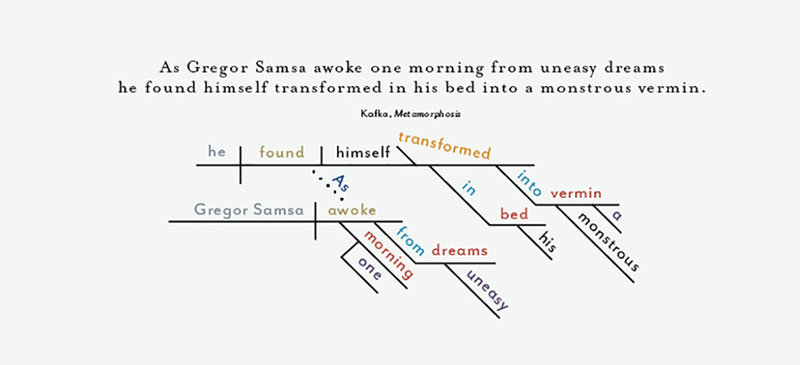Conveniently, Patrick O'Neill, Transforming Kafka: Translation Effects
(2014) presents versions of this famous opening sentence as handled by twelve English translators of "The Metamorphosis" over the period 1936–2009. First, I note that the German version of the sentence (according to O'Neill) is as follows:
Als Gregor Samsa eines Morgens aus unruhigen Träumen erwachte, fand er sich in seinem Bett zu einem ungeheueren Ungeziefer verwandelt.
Note the tell-tale comma after erwachte in this sentence.
Here are the dozen English translations of the sentence, as reported by O'Neill:
Jolas (1936: 27): When Gregor Samsa awoke one morning from troubled dreams, he found himself changed into an enormous bug.
Lloyd (1937/2008: 11–12): As Gregor Samsa awoke one morning from a troubled dream, he found himself changed in his bed to some monstrous kind of vermin.
Muir and Muir (1948/1970: 67): As Gregor Samsa awoke one morning from uneasy dreams he found himself transformed in his bed into a gigantic insect.
Corngold (1972: 3): When Gregor Samsa woke up one morning from unsettling dreams, he found himself changed in his bed into a monstrous vermin.
Underwood (1981/1986: 91): Gregory Samsa woke from uneasy dreams one morning to find himself changed into a giant bug.
Pasley (1992/2000: 76): When Gregor Samsa awoke one morning from troubled dreams he found himself transformed in his bed into a monstrous insect.
Appelbaum (1993/1996: 11): When Gregor Samsa awoke from troubled dreams one morning, he found that he had been transformed in his bed into an enormous bug.
Neugroschel (1993/2000: 117): One morning, upon awakening from agitated dreams, Gregor Samsa found himself, in his bed, transformed into a monstrous vermin.
Freed (1996/2003: 7): As Gregor Samsa awoke from unsettling dreams one morning, he found himself transformed in his bed into a monstrous vermin.
Stokes (2002: 3): When Gregor Samsa woke one morning from uneasy dreams he found himself transformed in his bed into a monstrous insect.
Hoffman (2006: 1): When Gregor Samsa awoke one morning from troubled dreams, he found himself changed into a monstrous cockroach in his bed.
Crick (2009: 29): As Gregor Samsa woke one morning from uneasy dreams, he found himself transformed into some kind of monstrous vermin.
We have seven translations that end the "As" or "When" clause with a comma, three translations that run the "As or "When" phrase into the rest of the sentence without a comma, one translation that structures the sentence with two commas (one after "One morning," and a second after "upon awakening from agitated dreams"), and one translation that rephrases the sentence in a way that gets rid of the introductory phrase altogether.
The diagrammed version of the sentence doesn't exactly match any of the twelve translations that O'Neill gives, although it comes quit close to Freed's translation (which includes a comma). That brings us to a baker's dozen of translations—eight with commas in place, four with commas missing, and one restructured to obviate the need for a comma.
On that record, it appears that the version with the comma is favored over the comma-omitted version by a 2:1 ratio—a significant but not overwhelming degree of preference. I would not hesitate to include a comma at the end of the "As" or "When" phrase, but enough translators didn't to suggest that either there are a lot of translators who don't know their punctuation rules or the rules are less iron-clad than many people suppose.
But even if we grant the comma-less translators their right to omit, we can find some degree of vindication in the fact that Kafka himself—cautious, furtive, punctilious writer that he was—included the comma right where it belonged.

